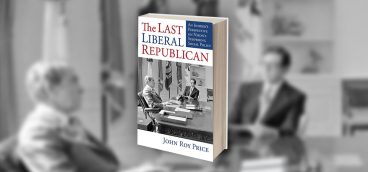A Meditation of Life in Twilight

Certain Pittsburghers could read Stewart O’Nan’s “Henry, Himself” just for the satisfaction of having their world described by a masterful writer. The Pittsburgh native’s novel, his 17th, takes place largely in the pleasant precincts of the East End, from well-tended houses in Highland Park to the Phipps Conservatory Flower Show in Oakland, Calvary Episcopal Church in Shadyside, and “the club,” which goes unnamed, but feels like a composite of the Pittsburgh Athletic Association, Pittsburgh Golf Club and the University Club. The scene sometimes moves to an ample-sized cottage on Lake Chautauqua that has been in the family for generations.
But this is no preppie costume drama that only cake-eaters can appreciate. “Henry, Himself” is a meditation on life as its end nears. It works whether you live in Poughkeepsie or Portland, if you absorb the prose slowly and allow yourself a kind of Episcopalian zen state. The story will especially resonate with those who don’t expect their time on Earth to be one profound revelation after another, yet find nobility in the ordinary. This is not a spoiler alert, but I believe the story’s essence is revealed when Henry Maxwell, 75, looks at his family gathered around the Thanksgiving table, recalls his own childhood holiday meals, and concludes: “There was a mysterious continuity to life that was reassuring, if the true significance of it escaped him.”
Or, the core insight may be delivered during the Easter service at Calvary, the church that Henry has attended and served faithfully since he was born. With visiting grandchildren at his side, Henry kneels for the Lord’s Prayer. O’Nan takes us inside his thoughts: “On the way back from the airport, he needed to stop at the Home Depot for propane and Drano and one other thing he had forgotten. … Receiving the Easter blessing, Henry remembered: grass seed.” For Henry Maxwell, a retired Westinghouse engineer and World War II combat veteran whose domestic domains are his workbench and home office, “There is nothing he enjoyed more than lying in bed, making a list of all he had to do tomorrow.” Opening up the Chautauqua house on Memorial Day weekend, Henry finds joy entering the garage: “Vacation, for him, meant the freedom to putter all day long.” Henry Maxwell lives a life of quiet perspiration.
Reviewers have marveled at O’Nan’s ability to create compelling fiction out of little to no action. “Henry, Himself” will burnish that reputation. It unfolds over the calendar year 1998, as Henry and his wife, Emily, go through its seasons and celebrations. His older sister, Arlene, a retired city schoolteacher living in Regent Square, is a constant presence. Their dog, a spaniel named Rufus, gives structure. The two grown children and their families are the source of both affection and stress. Margaret, a recovering alcoholic, lives in Detroit and is on the verge of divorce. Kenny, a dutiful underachiever, lives in New England with his wife, Lisa, who can’t stand Emily. The total of four grandchildren and the holiday visits are the organizing principle for everything.
On a family dysfunction scale of 1 to 10, the Maxwell clan would score 3, tops, by national standards. The underlying tension replicates the variety present in even the most well-adjusted families. O’Nan, a comrade of Stephen King and Dennis Lehane, writes with finely tuned foreboding. He can wring drama out of the everyday, from Henry’s project to stop Rufus from peeing wantonly over the backyard grass, to a Giant Eagle trip for Cascade dishwasher soap that goes awry when he brings the wrong discount coupon.
The coupon adventure is one example of the secular religion of the Maxwell household: frugality always. By any measure, they are well off. Henry grew up among Pittsburgh old money, in a large house on Mellon Street in Highland Park. “His own family, like most of their social set, had been proper, not demonstrative, abjuring emotion in favor of manners,” we are told, along with the fact that “his grandmother Chase had left the bulk of her estate” to the church. The amounts are never revealed, but we see that while Henry may have inherited fine china and rugs, and a cherished lake house, he did not coast on trust funds. As an engineer, Henry made a good living, one presumes, and he must have a decent pension. But every expenditure of money is painful. Henry sulks over $125 for a plumber to snake a drain, $700 for new tires for the Oldsmobile, $100 for an exterminator.
Yet every month, they cut a check for troubled daughter Margaret to cover her shortfall. Reflecting their generation, Henry and Emily spend as little as possible on themselves.
As in other O’Nan novels, acts of violence are offstage, refracted through the characters’ imagination. Such is the case with Henry’s memories of war savagery, which often rush in, “unbidden—Embree, Jansen and Davis, shot right next to him in the woods outside of Pforzheim. The gunner of a drowned tank, his bloated face wavering inches below the surface like a curious fish.” Henry was raised to be stoic. When he shipped off for basic training, there were no hugs: “His father had shaken his hand and looked him in the eye, as if this was another pact between them.”
“Henry, Himself” can be appreciated on its own merits, but it is properly understood as the prequel to two other novels of the Maxwells: “Emily, Alone” (2011) and “Wish You Were Here” (2002). This is a spoiler alert: Henry is not alive in those books. “Emily, Alone” is a mirror image of “Henry, Himself,” detailing the interior life of the widow Maxwell, and her adventures with her sister-in-law Arlene, through the same East End territory of Pittsburgh, in loving specificity. Henry is a distinct presence in both novels; the great reward for O’Nan fans is to have Henry Maxwell revealed in full at last.





